
Last week, Bangladesh formally took over the leadership of the group of nearly 50 countries in the Climate Vulnerable Forum (CVF) for the next two years. The governance of the CVF is through a Troika system, with the current chair and the two previous chairs making collective decisions. Thus, the Minister of Marshall Islands as the previous chair and the Minister of Ethiopia as the chair before, met virtually with the Bangladesh Foreign Minister to formally announce Prime Minister Sheikh Hasina as the new leader of the CVF as well as the V20, which is the group of the Finance Ministers of the CVF countries.
At the same time, Prime Minister Sheikh Hasina has also announced the appointment of Abul Kalam Azad, her previous Principal Secretary, as her Special Envoy for the CVF. This is indeed an excellent decision.
One of the new developments that is also planned during Bangladesh’s tenure as chair of the CVF is to set up a regional centre on climate change adaptation in Dhaka, in collaboration with the Global Centre on Adaptation (GCA) based in the Netherlands.
Over the years, each country that has led the CVF has initiated a centre of excellence to share their knowledge and help in capacity building of other CVF countries, such as a centre on renewable energy in Costa Rica, one on typhoon tracking in Philippines and another one on climate diplomacy in Ethiopia. Bangladesh now has the opportunity to make its Climate Change Centre into a major South-South centre on adaptation, but specifically on locally led adaptation.
Bangladesh was one of the first countries in the world to recognise the importance of climate change to our development. Under the Prime Minister’s leadership in 2009, we developed the first Bangladesh Climate Change Strategy and Action Plan (BCCSAP), which had six pillars and over forty actions identified. Then the Bangladesh Finance Minister set up the Bangladesh Climate Change Trust Fund (BCCSTF) to support the actions of the BCCSAP, and each year, has allocated the equivalent of approximately USD 100,000,000 to support the different activities of government agencies as well as civil society groups. Over the last decade, Bangladesh has invested hundreds of millions of its own funding in hundreds of activities around the country, with a special emphasis on supporting the most vulnerable communities in the most vulnerable regions. Government agencies as well as NGOs in Bangladesh have gained a significant knowledge of planning, as well as implementing, adaptation at the local level for different kinds of climate hazards, from floods and cyclones to droughts.
The second body of knowledge and experiences that Bangladesh has developed and can share with other countries is on cyclone disaster preparedness and developing climate change resilient strategies to deal with the aftermath of cyclones. Bangladesh can continue to develop its expertise in dealing with the loss and damage associated with climate change in post-cyclone recovery and rehabilitation, and adaptation to future climate change impacts.
The third foundation that Bangladesh has already established is the setting up of the Gobeshona network of over 50 universities and research institutions in the country, which has been developing research into action for decision-makers from the national government as well as sectoral and local government, and for NGOs and the general public. The annual Gobeshona conference held every January for the last six years has become a globally recognised event. In fact, the next conference, to be held in January 2021, can be joined with the Proposed Adaptation Summit event that is now being planned to be held on January 25, 2021.
A fourth advantage that has been established is the Least Developed Countries Universities Consortium on Climate Change (LUCCC), which is an official South-South knowledge sharing and capacity building initiative coordinated from the International Centre for Climate Change and Development (ICCCAD) in Bangladesh. This can be built upon for the CVF countries.
Finally, Bangladesh has been one of the global leaders on Community Based Adaptation (CBA) over many years and will be hosting the 15th annual International Conference on CBA in June 2021, to be hosted by BRAC. It will be an excellent opportunity for the government to collaborate with BRAC to make this a major global event next year.
All of these foundations that have been laid down by Bangladesh over the years will work in our advantage as the chair of the CVF. The two year tenure as CVF chair will be an opportunity for Bangladesh to establish its leadership on the topic of locally led as well as community based adaptation, and will allow us to share our experiences and knowledge with the other CVF countries.
Originally this article was published on June 17, 2020 at Daily Star. The author Prof. Saleemul Huq is the director of the International Centre for Climate Change and Development (ICCCAD) at the Independent University, Bangladesh (IUB).
Email: saleemul.huq@icccad.net






